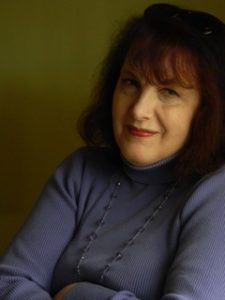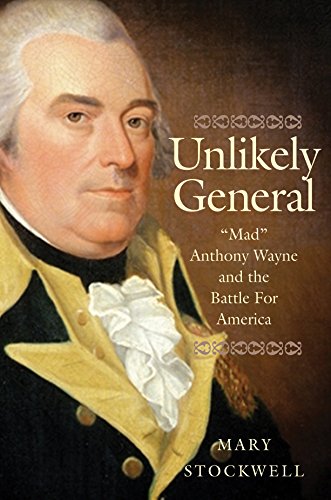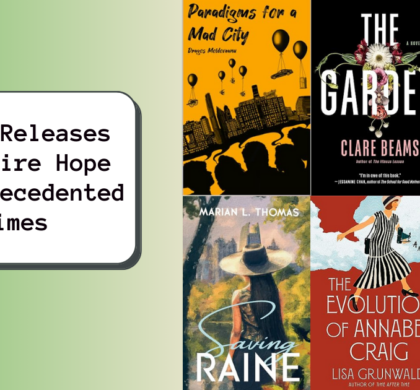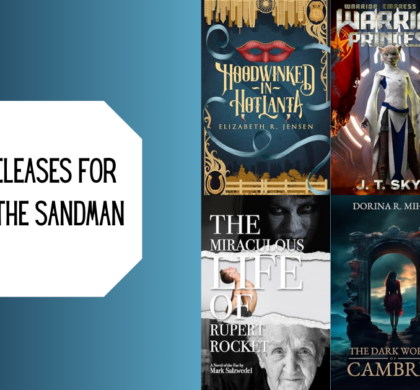Interview with Mary Stockwell, author of Unlikely General
14 May 2018
What can you tell us about your new release, Unlikely General?
It’s a surprising tale about a man, who if he is remembered today, is only recalled by the nickname of “Mad Anthony.” Even historians assume Anthony Wayne was a bloodthirsty general who loved war and who was thus an obvious choice to lead an army against Indians in 1792. Nothing could be further from the truth. No one wanted Wayne as the commander of the army, especially George Washington. It had been a decade since the American Revolution ended and Wayne was not well thought of by most people. His life was mired in scandal. He was a well-known womanizer. He was a spend-thrift who had nearly bankrupted his family’s estate. He had just been removed from Congress because his supporters had stuffed ballot boxes to get him elected. On some mornings, he was so sick and swollen that he had to wrap his arms and legs in bandages just to stand. He battled a crippling depression eased only by brandy and Madeira. But with two American armies already wiped out by the Indians, a desperate President Washington took a chance on Wayne. Little did he know that his former brigadier, once on fire for glory, had come to see war as a “horrid trade of blood” and fighting Indians as the worst trade of all.
Unlikely General: “Mad” Anthony Wayne and the Battle for America follows America’s most scandalous general from the moment he is appointed commander of the army in 1792 to his great victory at Fallen Timbers two years later and finally to his death in 1796 when his shattered body gave way at last to all the hardships he had endured for his country. The book also follows Wayne’s life through flashbacks that reveal how his past brought him to the present moment. Drawn from Wayne’s own passionate letters, where he confessed his deepest thoughts and emotions in a vivid style so different from the rationalism of his peers, my book tells the story of how Wayne gave up everything that mattered in life – his youth, his marriage, his family and friends, his health, and his fortune – to rescue a people who would forget all he had suffered on their behalf, except for the nickname they bestowed on him – “Mad Anthony.”
What’s the last book you read?
I just finished Seamus Heaney’s translation of the Aeneid Book VI. It was a Christmas present from my sister Roberta who is a professional cartographer and the mapmaker for Unlikely General. As a historian, I identify with Aeneas, who carried his father on his shoulders out of the burning ruins of Troy. In this book, he goes down in the underworld to meet his father who has died. I kept thinking when I read it that this is what historians do, and that this is what I must do as I write the proposal for my next book. I must go down into the past like Aeneas and bring all the people who once lived back to life again.
What or who inspired you to become an author?
I come from a long line of storytellers in my family. My father loved history and was especially proud of his Irish ancestry. He could tell stories about what the English had done to the Irish. But as Stockwells, an ancient Anglo-Saxon name, he taught us English history, too, at least up until the much-hated Henry VIII took the throne. He loved American history, too, and would quiz us about the past at the dinner table. My mother was an actress and a director; she could tell stories from books, plays and movies better than anybody I have ever met. The whole family on both sides would tell stories, especially about our relatives, who were all immigrants from Ireland, Canada, Poland, and Bohemia, when everyone came together at the holidays. What an atmosphere to grow up in and what an inspiration!
Say you’re the host of a literary talk show. Who would be your first guest? What would you want to ask?
It would have to be William Faulkner as long as he behaved himself and actually answered my questions. When I laid out Unlikely General, I decided that a man like Wayne, who is known by only one word, “mad,” needed a more vivid style to bring him to life than the usual “cradle to grave” format found in most biographies. So, I wrote the book more like a modern novel or a movie. There’s movement back and forth along two timelines: one heads with Wayne toward his victory at Fallen Timbers and the other flashes back through his life and the lives of the people he knew. I would like to talk to Faulkner now about how effective this style is, at least once a writer gets it down on the page, but how challenging it is to write. Like Faulkner, who wrote on the walls of his house in Oxford, Mississippi, I wrote my chapter outlines on wallpaper that was made of chalkboard. William and I would have great fun discussing storytelling, plotlines moving back and forth in time, and the best use of walls when writing.
What’s your favorite thing about writing?
When after imagining something for so long, I write it in such a way that my readers experience the same thing I imagined. This happened to one of the reviewers of Unlikely General. Wayne finally enters the narrative on Page 20 after a long list of terrible things have been said about him. I remember writing the line: “But how beautiful Anthony Wayne had been when he bounded into Washington’s camp on Long Island in April 1776.” A reviewer at Yale wrote about Wayne’s entry, “Magnificent!” To get a response like that from a reviewer meant this person had the same experience I had when reflecting on how low the older Wayne had fallen and then imagining the moment that a younger Wayne had burst onto the scene.
If you had an extra hour each day, how would you spend it?
I would spend it out under the sky at night looking at the stars, hopefully in a place where the stars can still be seen. To see how small we are and to think of the “great distances, and starlight,” like the poet Robert Penn Warren says in his beautiful poem, “Tell Me a Story,” that make up this experience we call time, all this would remind me how short the human story on earth, that we call history, has been. It would help me feel an even greater bond to everyone I write about and to express it in my work for my readers to experience, too.
What scene in Unlikely General was your favorite to write?
The most memorable scene to write was Wayne standing with his ragged and barefoot soldiers on the road leading to the surrender field at Yorktown. The layers of irony in the scene were overwhelming. Here stood Wayne, who had to beg politicians for clothes for his men, standing across the road from the French in their brilliant uniforms with their silk banners flying above them. In the midst of this great victory, he is depressed, tired of fighting, and for the first time in the war, wants to go home. As the defeated British and Hessians pass between him and the French, I remind the readers that a generation before the French were the enemy; now they are allies. Even more terrible, looking ahead, I also remind them that many of the men standing across the way from Wayne in their perfect uniforms will be dead in a dozen years, victims of their own revolution.
Do you have a motto, quote or philosophy you live by?
John Donne’s Meditation XVII. I first read the poem when I was 17. The words, “any man’s death diminishes me, because I am involved in mankind,” struck a deep chord within me. I copied the poem on an index card and posted it above my bed, so I could see it every morning and night. Here are the exact words that have guided my writing career ever since:
“No man is an island entire of itself; every man is a piece of the continent, a part of the main; if a clod be washed away by the sea, Europe is the less, as well as if a promontory were, as well as any manor of thy friends or of thine own were; any man’s death diminishes me, because I am involved in mankind. And therefore never send to know for whom the bell tolls; it tolls for thee.”

Mary Stockwell is the author of the new book Unlikely General.
Connect with Mary:
Author Website
Buy The Book
Sign up for our email and we’ll send you the best new books in your favorite genres weekly.
Related
grant
Recommended Posts

Books to Read if You Like The Hating Game
19 Apr 2024 - Books to Read if You Like..., eBook, News, Romance


